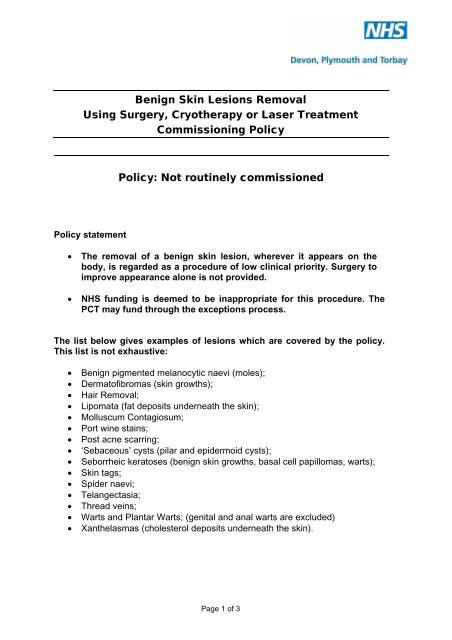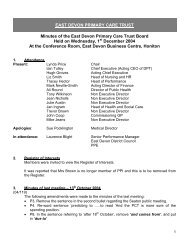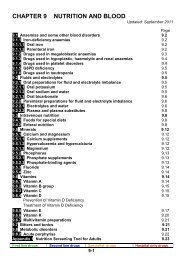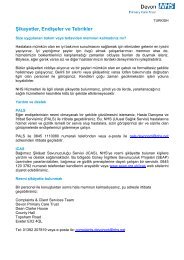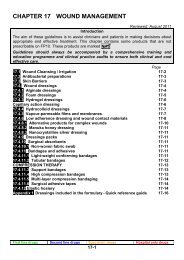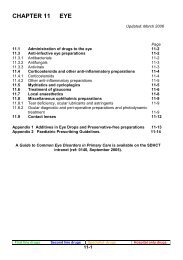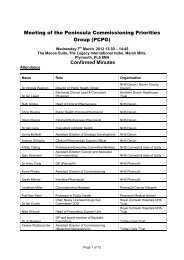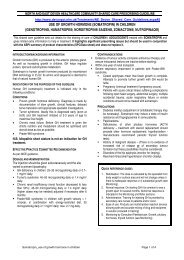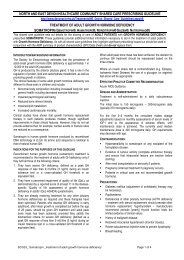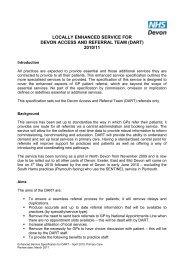Benign skin lesions removal - NHS Devon
Benign skin lesions removal - NHS Devon
Benign skin lesions removal - NHS Devon
You also want an ePaper? Increase the reach of your titles
YUMPU automatically turns print PDFs into web optimized ePapers that Google loves.
<strong>Benign</strong> Skin Lesions Removal<br />
Using Surgery, Cryotherapy or Laser Treatment<br />
Commissioning Policy<br />
Using Surgery, Cryotherapy or Laser Treatment<br />
Policy: Commissioning Not routinely commissioned<br />
Policy<br />
Policy statement<br />
• The <strong>removal</strong> of a benign <strong>skin</strong> lesion, wherever it appears on the<br />
body, is regarded as a procedure of low clinical priority. Surgery to<br />
improve appearance alone is not provided.<br />
• <strong>NHS</strong> funding is deemed to be inappropriate for this procedure. The<br />
PCT may fund through the exceptions process.<br />
The list below gives examples of <strong>lesions</strong> which are covered by the policy.<br />
This list is not exhaustive:<br />
• <strong>Benign</strong> pigmented melanocytic naevi (moles);<br />
• Dermatofibromas (<strong>skin</strong> growths);<br />
• Hair Removal;<br />
• Lipomata (fat deposits underneath the <strong>skin</strong>);<br />
• Molluscum Contagiosum;<br />
• Port wine stains;<br />
• Post acne scarring;<br />
• ‘Sebaceous’ cysts (pilar and epidermoid cysts);<br />
• Seborrheic keratoses (benign <strong>skin</strong> growths, basal cell papillomas, warts);<br />
• Skin tags;<br />
• Spider naevi;<br />
• Telangectasia;<br />
• Thread veins;<br />
• Warts and Plantar Warts; (genital and anal warts are excluded)<br />
• Xanthelasmas (cholesterol deposits underneath the <strong>skin</strong>).<br />
Page 1 of 3
Indications for direct referral include:<br />
Diagnostic Uncertainty<br />
Suspected malignancy (should be referred through via the two week suspected<br />
cancer system with the exception of suspected basal cell carcinoma). Skin<br />
<strong>lesions</strong> are often referred for specialist opinion because of concerns that there<br />
may be malignancy.<br />
Once it is established that a <strong>skin</strong> lesion is not malignant its <strong>removal</strong> will not<br />
normally be funded by the <strong>NHS</strong> though a clinician may request exceptional<br />
funding. Clinicians referring on this basis should make the patient explicitly<br />
aware that <strong>removal</strong> of the lesion may not occur.<br />
Liposarcoma<br />
If liposarcoma is suspected referrals should be made using the 2 week wait<br />
service. Patients with a previous history of malignancy (excluding Basal Cell<br />
Carcinoma) are at greater risk of developing lipo-sarcoma, therefore clinical<br />
judgement should be used in these cases. Prior approval to make a referral under<br />
this service is not required.<br />
Lipomas which are considered to be at higher risk of malignancy are those where<br />
one or more of the following criteria applies:<br />
• Measured diameter exceeds 5cm;<br />
• Significant persistent pain that is not solely pressure related;<br />
• Rapid growth over a short period of time;<br />
• Deep fixity to muscle or facia; or<br />
• Prior malignancy – other than Basal Cell Carcinoma.<br />
Once it is established that a <strong>skin</strong> lesion is not malignant its <strong>removal</strong> will not<br />
normally be funded by the <strong>NHS</strong> though a clinician may request exceptional<br />
funding. Clinicians referring on this basis should make the patient explicitly<br />
aware that <strong>removal</strong> of the lesion may not occur.<br />
Port Wine Stains/Vascular Lesions in Children<br />
Children with Port Wine Stains should be referred early to a Paediatric<br />
Dermatologist for a confirmation of the diagnosis/prognosis. Treatment of Port<br />
Wine Stains is not routinely commissioned and will not normally be funded by the<br />
<strong>NHS</strong> though a clinician may request exceptional funding. Clinicians referring on<br />
this basis should make the patient explicitly aware that <strong>removal</strong> of the<br />
lesion may not occur.<br />
2 of 3
Genital and Anal Warts<br />
Genital and anal warts should be referred to the Genito-urinary medicine service<br />
and are outside the scope of this policy.<br />
Infection<br />
Sebaceous cysts (a collection of sebum) are rarely truly infected.<br />
In <strong>lesions</strong> with evidence of persistent or recurrent infection, the <strong>removal</strong> of the<br />
lesion may be undertaken as an EXCEPTION to the decision not to fund the<br />
<strong>removal</strong> of benign <strong>lesions</strong>.<br />
These referrals are subject to monitoring through the Referral Management<br />
Centre. Referrals which do not meet the guidelines will be returned to the referrer.<br />
Procedures undertaken as EXCEPTIONS will be subject to retrospective audit and<br />
therefore will require clear documentation in the patient’s records.<br />
Additional Information<br />
Patients who are not eligible for treatment under this policy may be considered on<br />
an individual basis where their GP or consultant believes there is an exceptional<br />
clinical need that warrants a deviation from the rule of this policy.<br />
Individual cases will be reviewed at the PCTs Restricted Treatments Funding<br />
Panel upon receipt of a completed application from the patient’s GP, Consultant or<br />
Clinician.<br />
In making a case for exceptional clinical need it should be demonstrated that:<br />
• the patient is significantly different to the general population of patients with<br />
the condition in question;<br />
and<br />
• the patient is likely to gain significantly more health benefit from the<br />
intervention than might be normally expected for patients with that<br />
condition.<br />
The fact that a treatment is likely to be efficacious for a patient is not in itself, a<br />
basis for exceptionality.<br />
An application cannot be considered from patients personally.<br />
Policy prepared by:<br />
Policy effective from March 2012<br />
Policy review date: March 2015<br />
Tracey Kerslake, Business Manager -<br />
Commissioning Team, Torbay Care Trust<br />
and<br />
Fiona Phelps, Assistant Director of<br />
Commissioning, <strong>NHS</strong> Plymouth,<br />
3 of 3


